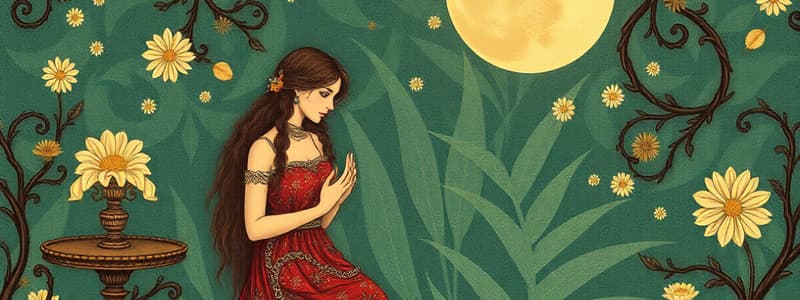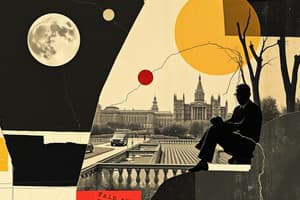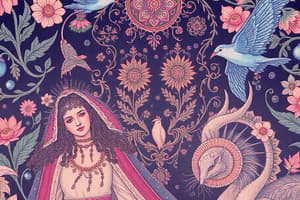Podcast
Questions and Answers
What is the first element of the plot in a short story?
What is the first element of the plot in a short story?
- Climax
- Introduction (correct)
- Inciting Incident
- Conclusion
Which part of the plot represents the highest point of interest in the story?
Which part of the plot represents the highest point of interest in the story?
- Climax (correct)
- Rising Action
- Falling Action
- Resolution
What does the acronym PACCTS stand for in relation to short stories?
What does the acronym PACCTS stand for in relation to short stories?
- Plot, Atmosphere, Character, Theme, Conflict, Setting (correct)
- Pacing, Atmosphere, Conflict, Theme, Character, Structure
- Plot, Arc, Conflict, Tone, Character, Style
- Plot, Action, Character, Theme, Closure, Setting
What does atmosphere in a story primarily refer to?
What does atmosphere in a story primarily refer to?
Which element follows the rising action in the plot structure?
Which element follows the rising action in the plot structure?
What role does the inciting incident play in the plot?
What role does the inciting incident play in the plot?
How does the conclusion of a plot contribute to the story?
How does the conclusion of a plot contribute to the story?
What does rising action include in the context of a short story?
What does rising action include in the context of a short story?
What defines a dynamic character in a story?
What defines a dynamic character in a story?
Which method of characterization involves the author directly stating a character's traits?
Which method of characterization involves the author directly stating a character's traits?
What is the role of the antagonist in a story?
What is the role of the antagonist in a story?
Which of the following best identifies a flat character?
Which of the following best identifies a flat character?
How does the author create atmosphere in a story?
How does the author create atmosphere in a story?
What is the typical length of a short story?
What is the typical length of a short story?
Which of the following is NOT a reason why we study short stories?
Which of the following is NOT a reason why we study short stories?
What is one principal function of a short story?
What is one principal function of a short story?
What role do short stories play when they raise questions?
What role do short stories play when they raise questions?
Which of the following statements is true about the short story 'The Tale of Two Brothers'?
Which of the following statements is true about the short story 'The Tale of Two Brothers'?
In what way can short stories serve as 'mirrors'?
In what way can short stories serve as 'mirrors'?
What is the primary focus when reading a short story for entertainment?
What is the primary focus when reading a short story for entertainment?
What does studying short stories help us understand about relationships?
What does studying short stories help us understand about relationships?
What is the primary role of conflict in a story?
What is the primary role of conflict in a story?
Which of the following is an example of internal conflict?
Which of the following is an example of internal conflict?
Which type of conflict involves a protagonist against societal customs?
Which type of conflict involves a protagonist against societal customs?
What does the term 'theme' refer to in a piece of fiction?
What does the term 'theme' refer to in a piece of fiction?
Which type of conflict is represented by a character facing a supernatural being?
Which type of conflict is represented by a character facing a supernatural being?
What typically indicates the theme of a short story?
What typically indicates the theme of a short story?
In which type of conflict does the protagonist struggle with limitations of their own body?
In which type of conflict does the protagonist struggle with limitations of their own body?
What is a key characteristic of external conflict?
What is a key characteristic of external conflict?
Which aspect of setting refers to the geographical location where the action takes place?
Which aspect of setting refers to the geographical location where the action takes place?
What is a characteristic of a first person point of view?
What is a characteristic of a first person point of view?
How does the setting influence a story?
How does the setting influence a story?
Which of the following is NOT a common theme found in literature?
Which of the following is NOT a common theme found in literature?
What does the third person point of view enable the narrator to do?
What does the third person point of view enable the narrator to do?
Which of the following best describes social conditions within a story's setting?
Which of the following best describes social conditions within a story's setting?
What does the term 'mood or atmosphere' refer to in the context of a story's setting?
What does the term 'mood or atmosphere' refer to in the context of a story's setting?
What is an implication of using the second person point of view in a narrative?
What is an implication of using the second person point of view in a narrative?
Flashcards are hidden until you start studying
Study Notes
Short Story Overview
- A short story is prose fiction typically under 10,000 words, designed to be read in one sitting.
- Length ranges from 5 to 60 pages; they are too short for standalone publication.
- Focuses on concentrated narrative experiences reflecting human lives.
Purpose of Studying Short Stories
- Explore lives and lifestyles beyond one's own experience.
- Acts as a bridge to personal culture and history, offering insights into human nature.
- Provides an escape from daily life, offering dreams and reflections.
- Confirms shared human experiences, especially regarding themes of loss and relationships.
- Stories serve as mirrors and signposts, giving meaning and direction to life.
Functions of Short Stories
- To Entertain: Engages readers and fulfills a vital purpose in storytelling.
- To Teach: Communicates particular viewpoints through narrative rather than direct exposition.
- To Raise Questions: Encourages deep thinking and introspection about familiar issues; the focus is often on questioning rather than answering.
Fun Facts
- The oldest short story, 'The Tale of Two Brothers', dates back to 1400 BC in Ancient Egypt.
- 'For Sale: Baby Shoes, Never Worn' is often regarded as the shortest short story by Ernest Hemingway.
PACCTS Elements of a Short Story
- Plot
- Atmosphere
- Character
- Conflict
- Theme
- Setting
Plot Structure
- Introduction (Exposition): Provides background information and introduces characters.
- Inciting Incident: The event that initiates conflict and sets the plot in motion.
- Rising Action: Series of complications that build up to the climax.
- Climax: The turning point with the highest tension and resolution of conflict.
- Falling Action: Reactions following the climax leading towards resolution.
- Conclusion (Denouement): Wraps up the plot and resolves outstanding issues.
Atmosphere
- Atmosphere conveys the story's mood and tone, deeply influencing reader engagement.
- Established through sensory details appealing to sight, sound, taste, touch, and smell.
Characterization
- Characters are portrayed as psychologically realistic and complex.
- Protagonist: Main character or hero of the story.
- Antagonist: Opponent of the protagonist.
- Characterization methods include direct and indirect techniques to reveal traits.
Types of Characters
- Round: Well-developed, complex, and realistic.
- Flat: Minor, one-dimensional characters with limited development.
- Dynamic: Characters who undergo significant growth or changes throughout the story.
Conflict
- Essential for plot movement, arising from opposition between forces.
- Types include external (struggles with outside forces) and internal (struggles within the character).
Types of Conflicts
- Person vs Person
- Person vs Self
- Person vs Society
- Person vs Nature
- Person vs Supernatural
- Person vs Technology
Theme
- The central idea or insight of a story, reflecting the author's perspective on a topic.
- Themes may cover human nature, morality, or societal issues, often expressed through symbols and figures of speech.
Setting
- Refers to the time and place of a story, influencing its mood.
- Considerations include geographical location, historical context, weather conditions, social conditions, and overall atmosphere.
Point of View (P.O.V.)
- The perspective from which a story is told, influencing reader connection and understanding.
- First Person: Narration from the character's viewpoint using "I" or "we".
- Second Person: Addresses the reader directly with "you".
- Third Person: An outside narrator describes characters and actions using "he", "she", or "they".
Studying That Suits You
Use AI to generate personalized quizzes and flashcards to suit your learning preferences.




